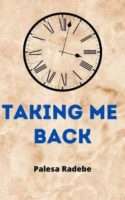Yesterday I was at the bank with my three-month old baby boy. I had been carrying him on my back and I was glad to finally put him down as I sat on the bank chairs. This boy is heavy, I thought. The lady sitting next to me looked at him, smiled and cooed. He smiled back at her.
Completely charmed she commented, “Oh! I have always wanted a baby girl, but all my kids are boys!”
I was confused for a second, and then I remembered that I had dressed Luthando in his pink jersey that my aunt had given to him. My aunt has girl children and so she only had girl clothes to give him when he was born. I was also carrying him with the little pink blanket from the same aunt. I thought I should clarify the situation to the lady.
“Oh no, this is also a boy,” I said.
“It’s a boy?” she cried in surprise, her faux-locked head shaking. “Are you saying this cute button is a boy?” she was clearly astonished.
I nodded.
“And how old is he?” she asked.
“Three months,” I replied. This sent her off the roof.
“Heee! This one? He looks at least six-months old,” she threw her manicured hands in the air.
By now she was almost howling and an older woman in traditional makoti attire across from us (the chairs were arranged in a semi-circle) wanted to know what the whole commotion was about.
“She says this boy here is three-months old,” the lady next to me told her pointing accusingly at me with her thumb and not looking at me.
“Why did she dress the baby up in pink?” asked the old makoti.
“Udlala ngomtwana lo. She’s making the baby a joke,” replied the lady next to me. A coloured woman joined the conversation.
“Lo mntwana uzoba sisitabane ndikuxele, the baby will turn gay I’m telling you,” but she was speaking isiXhosa so it came out as.
I shot her the “WTF?” look. She saw it.
“Nyani. The pastor said so yesterday,” she explained.
“Yooh! Izitabane!” another woman muttered loudly.
A tall, dark man who had been listening in chuckled with what I thought was shyness, then asked, “Azba yintoni edala lanto? I wonder what makes gay people gay?”
“Yilento,” the coloured woman pointed towards my son and me.
“The pastor said if a parent wishes for a girl child and instead gets a boy, their disappointment will cause the boy child to become a girl when he is older. Andithi he is becoming what his parents wanted him to be,”
The old makoti chipped in. “That is why I accept my children as they come. I don’t even want a gender revealing scan when I’m pregnant.”
Hayke ndazikhupha endabeni xakulapho. I didn’t know how to contribute to grown people ridiculing/complaining about gay people, especially since my son sparked the conversation.
“One thing that worries me about them is that they are violent! They always get drunk and then fight with other girls over their men,” Makoti accused.
“Ewe!” agreed another girl a little older than me, in her twenties. She was chewing gum wildly and laughing. “Kalok uManono was fighting this weekend with ooBusiswa nooAphiwe over this boy… Eish!” she said clicking her fingers, and still chewing wildly. “I forgot his name now. They were fighting and hair was flying and Manono’s fake sock boobs were halfway down his stomach by the end of it,”
Makoti was half dead with laughter. “Iyooh!” she exclaimed.
“You remember Gaba?” asked the coloured woman, addressing Miss Faux-locks next to me.
“Omphi? The one from Greenfields?”
“Ewe. Uyakhumbula wayendile? You remember he was married? Qha kengoku wasweleka umyeni wakhe. But his husband passed away.”
I had said I wasn’t going to participate in this conversation, but this was interesting. Wasn’t Gaba a man? How did he get traditionally married to another man? Wait, our culture allowed that?
“UGaba is a man, no?” I tentatively asked.
“Ewe,” replied the coloured woman. She had this thing of speaking and looking at you as though whatever she had to say was very important, with her eyes wide open and her head leaning toward you. “Qha kengoku he would wrap a towel around his waist every time he went to bed with his husband and refuse to be touched.”
Everyone burst out laughing.
“Ubaleka indoda yakhe? He was evading his husband?” someone asked.
“Kalok’ uTolo didn’t know that he was a man,” the coloured woman explained. More laughter.
“Wait, is that the same Tolo who was married to Thenjiwe?” the skinny man asked.
“Exactly,” answered the coloured woman.
“And where is that Thenjiwe while all of this is happening?” Gum-abuser asked.
“Thenjiwe died first. And then when Tolo married again he married Gaba, the gay man masquerading as a woman.”
And with that it was my turn to get up and go to the tellers. After that I quickly got Luthando on my back and left.
How the conversation started struck me as funny – all because a three month old boy wore pink.
***
Tell us: What do you think about the author’s experience?


